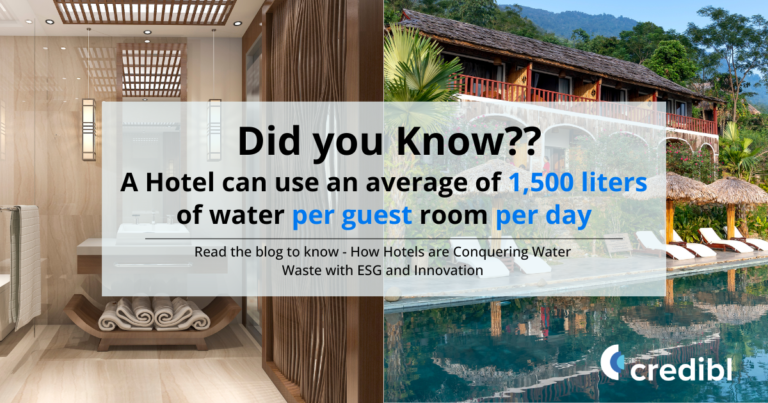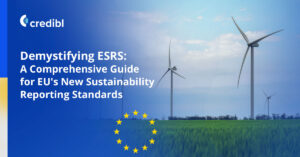Introduction to ESG and Sustainability in Hospitality
The hospitality sector is increasingly integrating Environmental, Social, and Governance (ESG) principles, with a significant focus on environmental sustainability. This section will highlight the importance of water conservation within the context of ESG, emphasizing its critical role in the industry’s sustainability efforts. It will set the stage for the discussion on innovative water conservation technologies and their alignment with ESG goals.
The Environmental Aspect of ESG: Water Conservation Trends
This part will explore the latest trends in water conservation, demonstrating how they align with the ‘Environmental’ component of ESG. Notable trends include the adoption of efficient plumbing fixtures, like low-flow toilets and aerated faucets, and water recycling systems that significantly reduce water usage. The importance of educating staff and guests on water conservation, collaborating with sustainable suppliers, and monitoring water usage for continuous improvement will be discussed. This approach shows a commitment to reducing environmental impact while also yielding cost savings and enhancing brand reputation.
Innovative Water Conservation Technologies
Advancements in technology play a crucial role in sustainable water management in the hospitality sector. This section will delve into cutting-edge innovations like digital leakage detection systems from startups like PipePredict, which use AI, sensors, and digital twins to monitor and optimize water network performance. Additionally, developments in wastewater processing, such as Oxyle’s nanocatalyst treatment reactors and Algaesys’s algae-based wastewater treatment, demonstrate the industry’s commitment to sustainability and innovation. These technologies not only contribute to significant water savings but also align with the broader ESG goals of reducing environmental impact.
Rainwater Harvesting in Action
Rainwater harvesting is gaining traction as a practical and effective method for sustainable water use in the hospitality industry. This section will explore how hotels are implementing rainwater harvesting systems, discussing the benefits these systems bring in terms of water conservation and ESG compliance. Real-world examples will be provided to illustrate successful implementations and the impact these systems have on both the environment and the hotel’s operational efficiency.
Case Studies in Water Conservation and ESG in the Hospitality Sector
- Global ESG Landscape in Hospitality: Many hotel brands are focusing on energy efficiency, carbon emissions, water conservation, and waste reduction as part of their ESG initiatives. Reporting standards such as the Global Reporting Initiative (GRI) are increasingly being used to track and benchmark performance against ESG targets. Tools and indices, like the Cornell Hotel Sustainability Benchmarking Index, aid in measuring the progress of hotels in sustainability areas, providing valuable data on energy efficiency, carbon emissions, and water usage across various countries. This holistic approach underscores a growing commitment to robust ESG strategies in the hospitality sector.
- Sustainable Development Goals (SDGs) Initiatives: A study highlighted the initiatives of five international hotels, including Ibis Getafe and the Zanzibar Collection, focusing on their engagement in sustainable actions. These hotels demonstrated commitment across the three main spheres of sustainability: economy, society, and the environment. Their actions positively impacted guests, staff, and hoteliers, and serve as a model for other hotels aiming to implement SDG goals.
- Sustainability Practices in a Luxury Hotel: An in-depth case study of a luxury hotel in Arrábida Natural Park revealed the implementation of various environmental and social sustainability practices. These practices included energy efficiency measures to reduce water consumption, waste, and carbon emissions, as well as social initiatives like relations with charitable institutions and creating a safe and healthy work environment. This case study exemplifies how luxury hotels can successfully integrate sustainability practices to reduce operational costs while maintaining high-quality services.
- WaterSaver Hotel Program: The San Antonio Water System (SAWS) conducted a commercial conservation case study that included the WaterSaver Hotel Program. This program illustrates how commercial customers, accounting for a substantial portion of annual water sales, can achieve significant water savings through conservation programs. Such initiatives underscore the potential for industry-wide water conservation efforts.
These case studies demonstrate the diverse ways in which the hospitality sector is integrating water conservation strategies into their broader ESG and sustainability goals. From global initiatives and reporting standards to specific hotel programs, the industry is making significant strides in reducing its environmental impact, enhancing social responsibility, and ensuring economic sustainability. These examples not only highlight the practical aspects of implementing such initiatives but also underscore the positive impacts they have on brand reputation, operational efficiency, and contribution to global sustainability efforts.
The Business Benefits of ESG in Water Conservation
The integration of ESG principles, particularly those focusing on water conservation, brings substantial business benefits to the hospitality sector. These benefits span across various dimensions:
- Cost Reduction: Implementing water-saving technologies and practices can significantly reduce water bills. The Environmental Protection Agency (EPA) estimates that water-efficient practices can help hospitality businesses save up to 30% on water bills. This is not only an operational cost saving but also contributes to overall financial sustainability.
- Enhanced Brand Reputation: In an era where consumers are increasingly conscious of environmental impact, hotels adopting sustainable practices are seen more favorably. This enhanced brand reputation attracts guests who prioritize sustainability, thereby opening up a new market segment. The shift towards sustainability also helps hotels align with global sustainability trends, making them more competitive and future-ready.
- Regulatory Compliance and Incentives: With governments around the world imposing stricter environmental regulations, hotels engaging in water conservation practices are better positioned to comply with these regulations, avoiding potential fines and penalties. In some cases, there are government programs and tax credits available for businesses that demonstrate efforts in sustainability, offering a financial incentive to adopt these practices.
- Long-term Sustainability: By reducing their environmental footprint through water conservation, hotels contribute to the long-term sustainability of the local ecosystem. This is particularly important in water-scarce regions where conservation efforts can have a significant impact on local communities and the environment.
Conclusion and Role of Credibl ESG
In conclusion, water conservation in the hospitality sector is not just an environmental imperative but a strategic business decision that aligns with broader ESG goals. The adoption of innovative technologies, such as low-flow fixtures, rainwater harvesting, and digital water management systems, demonstrates the sector’s commitment to sustainable practices. The real-world case studies illustrate the diverse and successful implementation of these strategies, showing the tangible benefits in terms of cost savings, enhanced brand reputation, regulatory compliance, and contribution to environmental sustainability.
Furthermore, for hotels and hospitality businesses looking to embark on or improve upon their water conservation and sustainability journey, Credibl ESG offers a valuable partnership. Credibl ESG’s expertise in sustainability can assist these businesses in implementing effective water conservation strategies, tracking their ESG performance, and communicating their sustainability achievements to stakeholders. By leveraging the resources and guidance from Credibl ESG, hotels can not only enhance their operational efficiency and sustainability profile but also contribute positively to the global ESG agenda.







